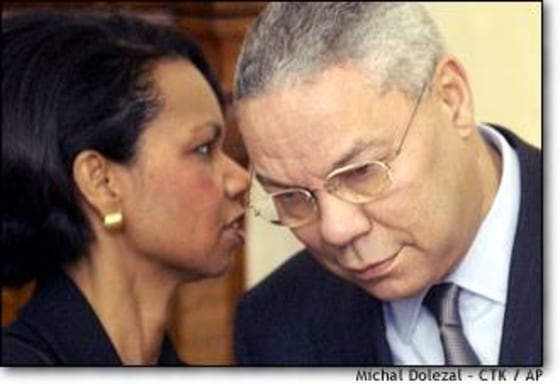National Security Adviser Condoleezza Rice is the latest administration official to suggest that the United States may not wait much beyond Dec. 8 to launch a war on Iraq. That’s the date by which Saddam Hussein must provide a full account of all aspects of his nation’s chemical, biological, nuclear and ballistic weapons program. But the United States may be hamstrung by the terms of the U.N. resolution it helped draft.
Speaking in Prague on Thursday, Rice warned that if Saddam doesn’t comply, “we have to be careful about wasting the time ... and hunting and pecking all over the country.”
The hunting and pecking appeared to be a reference to the mission of U.N. weapons inspectors, who returned to Iraq after a four-year hiatus this week — and who will officially begin their inspection mission on Nov. 27.
“We’re deeply skeptical that this regime is ever going to fully live up to the U.N. Security Council resolutions,” Rice said. “We haven’t seen anything yet which suggests ... that this is a leopard that’s changing its spots.”
President Bush was equally blunt in Prague a day earlier, noting that Saddam had been given a very short time to be truthful about his “arsenal of terror.”
He added, “Should he again deny that this arsenal exists, he will have entered his final stage with a lie. And deception this time will not be tolerated. Delay and defiance will invite the severest of consequences.”
SUFFICIENT GROUNDS
However, based on the latest resolution, which was drafted by the United States and Britain, failure by Saddam to comply with the Dec. 8 deadline is not in itself sufficient grounds for “material breach,” the trigger for military action.
According to paragraph 4 of Resolution 1441, false statements or omission in the declaration must be accompanied by a failure by Iraq to cooperate fully with the implementation of the resolution before it would constitute “further material breach of Iraq’s obligations.”
In other words, the world may have to waste some time to either prove that Iraq is not being honest, or for the inspectors to be prevented by Iraq from carrying out their mission so that chief inspector Hans Blix can report a “material breach” to the Security Council.
So far, Iraq has denied possessing any banned weaponry and has pledged, albeit grudgingly, to cooperate with Blix and his team.
It remains to be seen how this tense process will work on the ground, once the inspections begin.
But a minimal amount of cooperation and a failure by the inspectors to immediately find a mother lode of banned weaponry could extend the process for weeks, even months.
NO-FLY ZONES
It also would frustrate those within the U.S. administration who would like to let loose on Saddam as soon as possible.
This potential difficulty with meeting both elements of the U.N. resolution may be the reason U.S. officials have raised the issue over the past week of the tit-for-tat clashes in Iraq’s no-fly zones.
On Thursday, the U.S. Central Command said that coalition planes — U.S. and British aircraft — came under fire for a second straight day in the southern no-fly-zone, about 170 miles south of Baghdad.
The military’s statement noted pointedly that Iraq has fired on seven out of the last eight days since Baghdad accepted the U.N. resolution. Still, there have been hundreds of such incidents in the no-fly zones since the end of the Gulf War.
Several U.S. officials, including Secretary of Defense Donald Rumsfeld, have suggested that the surge in attacks is a breach of the new resolution, which says Iraq should not “take or threaten hostile acts” against U.N. member states who are taking action to uphold the Security Council resolution.
But there has been a long-running dispute at the United Nations over the authority of Britain and the United States to supervise the no-fly zones, which are not recognized by Russia and China, two key veto-holding members of the Security Council.
The United States and Britain assert that their legal basis is in a resolution adopted after the 1991 Gulf War on halting Saddam Hussein’s repression of Kurds and Shiites.
But even Britain is reluctant to make an issue of the surge in attacks on the coalition aircraft.
“For the Iraqis to fire on aircraft enforcing the no-fly zones is a violation of that resolution,” a British diplomat said this week, referring to Resolution 688. “But Resolution 1441 is about disarmament, not about the no-fly zones, in our view,” he said.
(Sean Federico-O’Murchu is international producer/editor for MSNBC.com. The Associated Press contributed to this report.)
